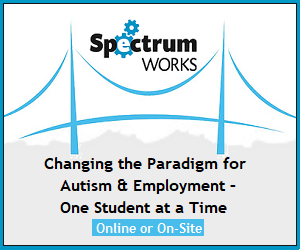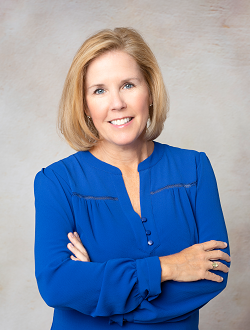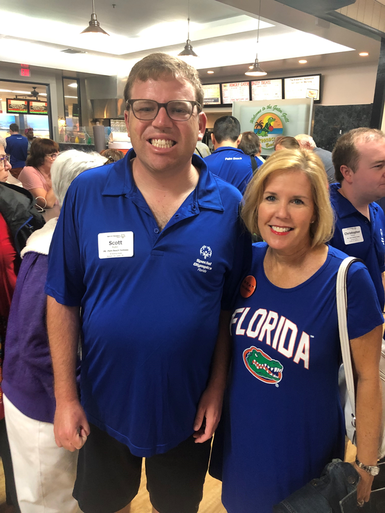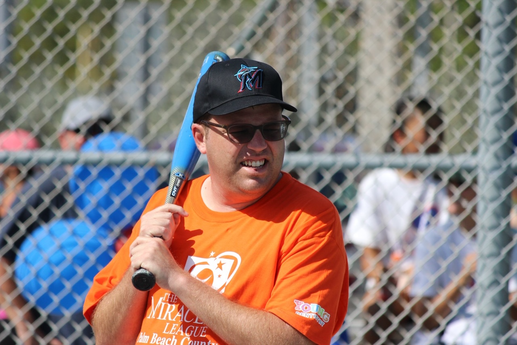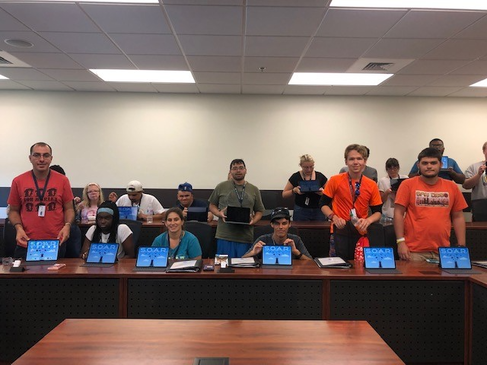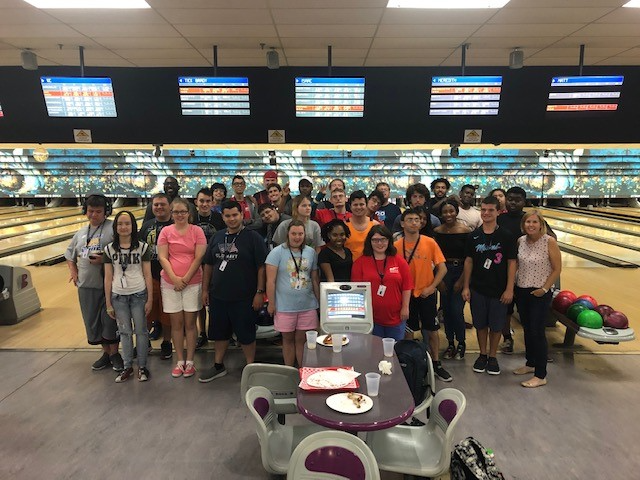April 2021 Featured Interview
Sanctuary's 4th Annual Autism Awareness Issue Proudly Sponsored By:
Interview with
Michelle Rubin
Founder of Autism After 21
Photo Credit: Warner Prokos Photography
About Michelle:
Michelle Rubin successfully works with young adults on the autism spectrum through her nonprofit Autism After 21. As the founder and president, she developed the SOAR program – Summer Opportunity for Adult Readiness. She collaborates with the State of Florida Division of Vocational Rehabilitation to serve customers needing transition services to join the workplace and learn independence. Michelle is growing this program based on college campuses around the State of Florida while retaining the very elements that have made the program so successful. Autism After 21 is now adding On-the-Job Training programs as part of its services. She sees this as the next step for students in transition.
Her involvement with the community goes back decades. As a past president of The Junior League of Boca Raton, Michelle has insight into what makes Boca Raton a wonderful place to live. Giving back comes naturally to the whole family. They have been involved in Miracle League Baseball since its beginning. Michelle’s son, Scott, is a player and his brothers, Andrew and Matt, volunteer as buddies. Miracle League came into their lives at a time when there weren’t recreation opportunities for people on the spectrum.
Outside of the office, Michelle enjoys the outdoor Florida lifestyle with her family in Boca Raton.
About Autism After 21:
Autism After 21 is a Florida-based nonprofit organization dedicated to opening possibilities for people on the autism spectrum. The organization’s biggest purpose is to provide education, mentorship and advocacy to further life skills and support for young adults on the spectrum.
Her involvement with the community goes back decades. As a past president of The Junior League of Boca Raton, Michelle has insight into what makes Boca Raton a wonderful place to live. Giving back comes naturally to the whole family. They have been involved in Miracle League Baseball since its beginning. Michelle’s son, Scott, is a player and his brothers, Andrew and Matt, volunteer as buddies. Miracle League came into their lives at a time when there weren’t recreation opportunities for people on the spectrum.
Outside of the office, Michelle enjoys the outdoor Florida lifestyle with her family in Boca Raton.
About Autism After 21:
Autism After 21 is a Florida-based nonprofit organization dedicated to opening possibilities for people on the autism spectrum. The organization’s biggest purpose is to provide education, mentorship and advocacy to further life skills and support for young adults on the spectrum.
Myrna Beth Haskell, executive editor, spoke with Michelle about her journey with her son Scott, the inspiration behind the founding of Autism After 21, and skills young adults on the spectrum need in order to reach their potential.
What was the inspiration behind the founding of Autism After 21?
I have three sons, and my oldest son, Scott, is on the spectrum and was diagnosed to be moderately to severely autistic when he was two years old. He just turned 29. You didn’t hear much about autism back then. What I did hear was that there were not enough kids with autism for communities to add programs.
For perspective, I went to our local university that had special education and speech-language pathology programs. I put up a flyer saying that I was looking for graduate students who would want to work with a two-year-old with autism. I got a flurry of calls because no one had seen a two-year-old with autism. These students came to our home, and we developed a program. We did that for many years, before we could get Scott into a school district-based program.
When Scott was 18 and ready to graduate high school, it really hit me that he was going to be leaving the structure we all had gotten used to. When I started looking to see what his next steps might be, there was no next. He wouldn’t be going to college or to a vo-tech school. Autism After 21 was born out of that frustration and fear I had as his parent.
What was the inspiration behind the founding of Autism After 21?
I have three sons, and my oldest son, Scott, is on the spectrum and was diagnosed to be moderately to severely autistic when he was two years old. He just turned 29. You didn’t hear much about autism back then. What I did hear was that there were not enough kids with autism for communities to add programs.
For perspective, I went to our local university that had special education and speech-language pathology programs. I put up a flyer saying that I was looking for graduate students who would want to work with a two-year-old with autism. I got a flurry of calls because no one had seen a two-year-old with autism. These students came to our home, and we developed a program. We did that for many years, before we could get Scott into a school district-based program.
When Scott was 18 and ready to graduate high school, it really hit me that he was going to be leaving the structure we all had gotten used to. When I started looking to see what his next steps might be, there was no next. He wouldn’t be going to college or to a vo-tech school. Autism After 21 was born out of that frustration and fear I had as his parent.
|
Michelle (right) with her son Scott
|
The good news was that I had a lot of background with nonprofits. I had been president of the Junior League, and without that nonprofit experience, I wouldn’t have been able to do it.
So, we started Autism After 21 around the same time that we were looking into a transition program that the local school district was co-hosting with a little college located behind us in our neighborhood. This was a two-year program where the students learned about jobs and how to use public transportation. I really pushed hard to get Scott into this program because some people didn’t agree he should be there. But I instinctively knew this would be good for him. Working with the other students was challenging for him. He didn’t speak until he was 14. At first glance, he seemed to be the lowest functioning student in the group. A year later, he was excelling in the program. We let him ride his bike there by himself which was a huge deal. [Those running the program] later admitted to me that it was an eye-opener. They were stunned by how well Scott was able to perform. It took a few years for us to narrow our nonprofit’s focus on career exploration, job readiness and self-advocacy. We have a mantra: Know what you want. Know what you need. Know how to get it. |
Do you plan to expand at all?
Actually, we had a big expansion underway. We spent a lot of time on this in 2019, but you know what happened in 2020 [the global pandemic]. We had plans to expand within Florida and were slated to be on four additional college campuses for our summer residential program, with additional plans to expand outside of Florida as well. But we had to backtrack. I’ve been told that campuses will be opening up for outside programs this summer. But my out-of-state plans have been pushed back as well. I’m hiring new staff which will allow me more time to work on future programming.
Actually, we had a big expansion underway. We spent a lot of time on this in 2019, but you know what happened in 2020 [the global pandemic]. We had plans to expand within Florida and were slated to be on four additional college campuses for our summer residential program, with additional plans to expand outside of Florida as well. But we had to backtrack. I’ve been told that campuses will be opening up for outside programs this summer. But my out-of-state plans have been pushed back as well. I’m hiring new staff which will allow me more time to work on future programming.
|
What are the most important skills a person on the spectrum should develop in order to transition to college, the workforce, and ultimate independence?
Self-advocacy is so important. It’s imperative that those on the spectrum learn to be out in the world without parents and teachers advocating for them. It’s frightening for parents to let go. I spent years getting my son to do things he didn’t want to do – those things he felt extremely uncomfortable doing. You have to teach them about their community – what’s safe and what’s not safe. Those on the spectrum are often sheltered and enabled by their families, so they don’t learn about what’s out there. I had a local police officer come to our house. I also took Scott to a morning meeting at the police station and explained to the officers where Scott works, where he goes to the gym. I told them that Scott might not act appropriately if approached by police and would likely not be able to answer questions, [particularly if under duress]. |
Scott Participating in Miracle League
|
Autism After 21 offers consulting to parents. I often get asked, “How did you get Scott to do so much?” Parents might not like the answer. It was not easy, and I know that not every parent can do it. I had to take Scott out of his comfort zone – constantly.
Michelle also explains that everything took extra effort.
It took a year for him to learn how to use a fork.
In your experience, what is the most difficult hurdle for independent living?
Outside of self-advocacy, accepting that being an adult is difficult and that you won’t always have support. Not everyone is nice. They must learn how to deal with painful lessons on their own. The world isn’t always a safe place.
Michelle also explains that everything took extra effort.
It took a year for him to learn how to use a fork.
In your experience, what is the most difficult hurdle for independent living?
Outside of self-advocacy, accepting that being an adult is difficult and that you won’t always have support. Not everyone is nice. They must learn how to deal with painful lessons on their own. The world isn’t always a safe place.
|
What are some skills students learn in SOAR, Autism After 21’s summer program?
It’s a two-week program for students 18 and older. They live in a dorm with college students who are mentors. I equate this for most of our students to being dropped off on Mars. For many, it’s the first time they’ve been away from home. We counsel parents as well – how important it is for them to have a life, to not deal with autism 24-7. The students are in various classes Monday through Friday. The weekend in between is for fun. They learn how to work as part of a team. They also learn about tolerance because many of our students are intolerant of others in the program. They work on mindfulness and communication exercises. They must learn about how the school environment and work environments are different. They practice job interviews and discover realistic career paths. We don’t want them to sell themselves short, but their goals need to be attainable. We focus on desires versus abilities. In other words, here are the opportunities that fit your skill set and your interests. |
|
|
Students in Class: SOAR PROGRAM
Photo Courtesy: Autism After 21 |
We help them develop connections before they leave, too, such as developing a LinkedIn page and collecting contact information from others. Tell me about your Peer Mentoring Program. Peer mentors are trained by the State of Florida. When students leave SOAR, we try to pair them with a mentor who is similar in age - no more than five years apart. These mentors help [their mentees] fill out job applications, go to job fairs, or attend events that might otherwise be uncomfortable, such as a sports league or dance. Our alumni program consists of those who were SOAR students. Some have been trained as mentors. We like to hire from within if we can. |
Let’s Talk About Money, one of your upcoming events, is scheduled for June. Besides basic accounting skills, such as check writing and balancing accounts, do you also teach attendees about how others can take advantage of them – asking for money, etc.?
We do talk about that. It’s incredibly sad, but sometimes it takes a bad incident for the real learning to take place. It can be heartbreaking to learn how someone has been taken advantage of. No one talks about these insidious problems.
If someone asks to borrow money, parents should help their children set parameters – if you don’t know someone, or you just met the person, say no. If it’s a friend you trust, then a small amount (less than $20) is okay to lend. Everything is black and white in a lot of ways – they’ll just believe people. We’ve asked someone from TD Bank to talk to the students, and if a discussion about debit cards comes up, half the class yells out their pin number.
Those on the spectrum often have difficulty navigating friendships and romantic relationships. Do any of your programs address this?
We do talk about that. It’s incredibly sad, but sometimes it takes a bad incident for the real learning to take place. It can be heartbreaking to learn how someone has been taken advantage of. No one talks about these insidious problems.
If someone asks to borrow money, parents should help their children set parameters – if you don’t know someone, or you just met the person, say no. If it’s a friend you trust, then a small amount (less than $20) is okay to lend. Everything is black and white in a lot of ways – they’ll just believe people. We’ve asked someone from TD Bank to talk to the students, and if a discussion about debit cards comes up, half the class yells out their pin number.
Those on the spectrum often have difficulty navigating friendships and romantic relationships. Do any of your programs address this?
|
We just did a Saturday seminar about dating, and we discuss relationships during SOAR. We teach physical boundaries, safety, and what it means to be asked to have sex with someone.
After about 48 hours in our SOAR program, the students start to relax. These young people are starved for social time with peers, and they realize relatively quickly that they are not being judged. We’ve had [romantic] relationships develop during SOAR. Of course, there are strict boundaries set during the program. It’s usually the first time they’ve experienced this. Do you think it’s important for an adult on the spectrum to find a peer group with those who have similar interests? We encourage this as a way of meeting people, rather than online dating which I find frightening, especially for those on the spectrum. We’ve heard some scary stories. We suggest that they find adult education classes – dance, photography, a Zumba class. This is a genuine way to meet people who enjoy the same things. |
Strikes Group
Photo Courtesy: Autism After 21 |
Should a parent’s relationship/role be different for an adult child on the spectrum than it is for an adult child who is neurotypical?
I think the expectations should be the same. I wanted all of my sons to grow into kind and caring individuals. I also wanted them all to push themselves to do what they were capable of. Scott is not as capable, but he is willing to push himself to his potential. I also wanted them to accept responsibilities for their actions.
Those on the spectrum do need more support, but the general expectations should be the same.
As a mom of an adult son on the spectrum, what was the most important thing you taught your son that enabled him to navigate life’s challenges?
Even when you’re afraid, just try it. We’d make Scott go somewhere or do something he was uncomfortable with, and he would come home and say it was not so bad.
Where do you find sanctuary?
Playing team tennis. I like the physical component, and it’s good for my mind. I also participate in Stitch ‘n Bitch – a needlepoint group. We stitch, eat dinner, drink wine and relax.
I think the expectations should be the same. I wanted all of my sons to grow into kind and caring individuals. I also wanted them all to push themselves to do what they were capable of. Scott is not as capable, but he is willing to push himself to his potential. I also wanted them to accept responsibilities for their actions.
Those on the spectrum do need more support, but the general expectations should be the same.
As a mom of an adult son on the spectrum, what was the most important thing you taught your son that enabled him to navigate life’s challenges?
Even when you’re afraid, just try it. We’d make Scott go somewhere or do something he was uncomfortable with, and he would come home and say it was not so bad.
Where do you find sanctuary?
Playing team tennis. I like the physical component, and it’s good for my mind. I also participate in Stitch ‘n Bitch – a needlepoint group. We stitch, eat dinner, drink wine and relax.

